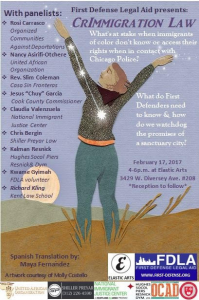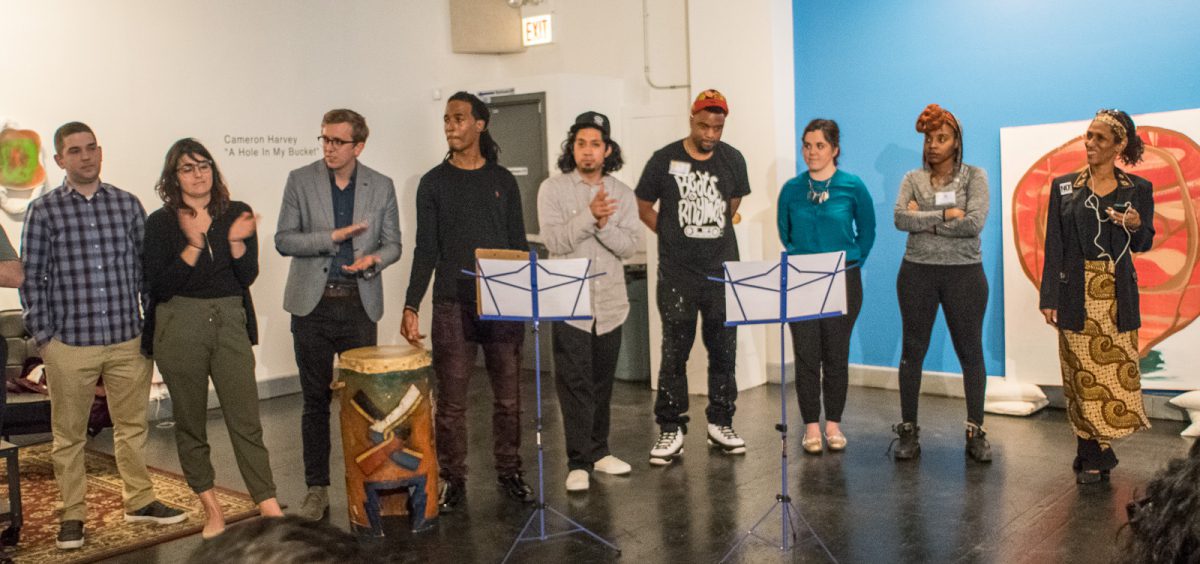On February 17, First Defense Legal Aid hosted a “CrImmigration” panel discussion to address these questions: What’s at stake when immigrants of color don’t know or access their rights when in contact with Chicago Police? What do First Defenders need to know & how do we watchdog the promises of a sanctuary city?
The event was sponsored by a number of local legal aid programs and community organizations. Speakers included our own Professor Richard Kling as well as legal aid volunteers, civic leaders and immigration community organizers.
Organizations:
- FDLA: First Defense Legal Aid
- NIJC: National Immigrant Justice Center
- OCAD: Organized Communities Against Deportation
- United African Organization
Panelists:
 Rosi Carrasco – OCAD
Rosi Carrasco – OCAD- Nancy Asirifi-Otchere – United African Organization
- Reverend Slim Coleman – Casa Sin Fronteras, Familia Latina Unida
- Lilian Jimenez for Cook County Commissioner’s office ( Jesus “Chuy” Garcia wasn’t able to make it, but a staff member came)
- Claudia Valenzuela – NIJC
- Chris Bergin – Shiller Preyar Law Offices
- Kalman Resnik – Hughes Socol Piers Resnick & Dym
- Professor Richard Kling – Chicago-Kent College of Law
- Kwame Gyimah – FDLA volunteer moderator
Video of “CrImmigration” Event
View the full event, including the introductory musical performance and the panel discussion in the video below from CAN TV.
You can find notes summarizing Professor Kling’s commentary with links to specific points in the video below.
Commentary from Professor Richard Kling
As a criminal defense lawyer, one of the worst things is seeing how plea deals worked out by public defenders have a very different effect on immigrants. It’s a difficult dilemma because staying in jail until a case can be argued puts a burden on them, especially with potential bail costs. But having a conviction on their record, even for very minor offenses, can make ICE cases much more difficult.
Professor Kling always recommends caution if someone is arrested: Do not resist arrest. He described how his daughter was arrested at a Gay Pride parade, but had been advised to always be courteous to the police. The charges were eventually dismissed, but the officer sent a letter saying “This was the most polite group of individuals that I ever had the occasion to arrest.”
"Resisting Arrest" is also v. dangerous for #immigrants, need for real warrants, having attorney to call is key – Prof. Richard Kling
— EBarney (@EBarney) February 17, 2017
Resisting arrest often leads to additional charges, it can be dangerous physically. If ICE comes to your door they have to have a warrant to come in. There is no need to cooperate beyond your rights, but keeping quiet and not resisting arrest is key.
Police may not admit to custody, may say they're witnesses not suspects to keep lawyers away – be respectful but quiet. @FirstDefense606
— EBarney (@EBarney) February 17, 2017
The most important thing for all people to know is to not talk to police without a lawyer present. FDLA or their personal lawyers may prevented from accessing them. It’s very important that anyone, immigrant or not, wait to speak until they see their lawyer.
A immigrant put into the state penitentiary system will get an ICE detainer to deport them directly from the penitentiary system after their time is served, even for minor offenses like small retail theft.
Photos from the Event







